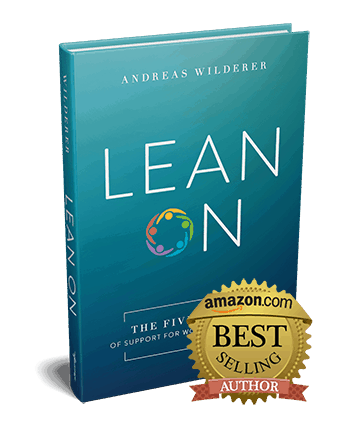Listen to Andreas Wilderer and Steven John Martinez talk about Stay-At-Home Dads.
By Steven John:
“While it’s not unusual for women to be the main breadwinner in their family, an increasing number of dads are staying home as the primary caregiver for the children.
Andreas Wilderer, author of Lean On: The Five Pillars Of Support For Women In Leadership, came on the program to discuss how being a stay-at-home dad can benefit the children, provide added support to a wife with a demanding career, and ultimately help make the marriage better.
Men can get over the stigma often attached to being a stay-at-home father by looking beyond their own interests and thinking of the greater good of their family and their marriage.
Listen to the interview in this segment of Eye on the Community.”
https://kfrog.radio.com/blogs/eye-on-the-community/support-for-stay-at-home-dads
Steven:
Would being a stay at home dad be the best for your family. Well I’ll be talking about that with my next guest, Andreas Wilderer, author of Lean On: The Five Pillars of Support for Women in Leadership. Thank you for joining me today, Andreas. I appreciate it.
Andreas W:
Thank you Steven.
Steven:
Now first of all, give us some background on yourself and tell us why you decided to write this book.
Andreas W:
So I’m German from background. I came 10 years ago to the United States and while I was not allowed to work at the beginning, I started to be a stay home dad, and so now for 13 years I’m taking care of my two kids and being a stay at home dad showed me so many challenges. I wanted to share my experience and solutions with others out here.
Steven:
Now what are some of the main factors that a person should consider when they’re deciding whether or not the family is best served by the father staying at home with the children?
Andreas W:
So for one it’s the financial aspect. Can your family afford for you to be at home, or does it even make sense for you to be at home? But another more important aspect is, is the man up to being a stay at home dad? Does it play into his dreams of where he wants to be, his fulfillment, or in his masculinity?
Steven:
Right. Because I imagine some men think that they have to be the breadwinner in the household.
Andreas W:
Yes. Unfortunately that’s still a misconception many of us have and a definition of being masculine. I need to be the breadwinner. I need to be this old guy taking care of my family. But luckily it’s changing. This misconception is changing and we have more and more men who redefine masculinity new.
Steven:
What are some of the other negative assumptions that people make about the stay at home dad, and how can we overcome them?
Andreas W:
So negative assumptions. You are not good enough to earn enough money yourself to take care of your family. Another one is, how can a dad ever replace a mom and raise the children? Dads are here for babysitting and not to raising children. And are you sitting the whole day on the couch or what are you doing? Or are you really taking care of the household or can you even cook? Those are a lot of misconceptions out here or things we hear over and over, and we have always to work against those.
Steven:
So how can we overcome those misconceptions?
Andreas W:
For the people in this role, they know that those are stigmas and they overcome it by themselves. As society, we have to be more open about it. We have to think about why should be parenting attached to gender? Men can parent the same way as women do, maybe sometimes even better. As societies, we just have to be more open-minded and accept other people, other family models as good as the one we grew up with.
Steven:
What are some of the conflicts that can come up in a marriage due to the stay at home dad scenario and how can a couple deal with them?
Andreas W:
We have those conflicts coming between the female that goes to work and the dad who stays home when they don’t define their roles and say, “Who is responsible for what? Who makes the rules for something?” Who makes the rules for the kids? Is dad making the rules, since he is the stay home dad, or is mom still making the rules? Is she really empowering him, if we say he is staying home, he needs to be empowered to act as the primary nurturer. On the other hand, if she goes to work, she needs to be supported by her husband or partner in a way that she deserves it. Don’t give her a hard time when she comes home late or is traveling all the time. She’s the breadwinner and she needs to do those.
Steven:
What are some of the basic household responsibilities? How do those responsibilities shift when the dad decides to stay home?
Andreas W:
So the normal responsibilities like cleaning the house, washing the laundry, cooking and preparing meals for the kid, driving the kids around, and they have been done by the women or the mom for years and years, and they have just to be taken over by the dad because they can do the same responsibilities as good as the moms has done before. The to do list stays with the husband. You cannot expect for her to come home and suddenly start cutting the grass and doing all those. But it’s more about those responsibilities of how can I support my partner really? What does my partner need? And those responsibilities change from family to family, and you only know them by having an open conversation with each other. What do you need from me? How can I support you actively?
Steven:
And also in Southern California, the kids have practice after school, they have soccer practice after school. Things have to change from, I guess being a soccer mom to being a soccer dad, and him doing all the taxiing and ferrying the kids around from activity to activity.
Andreas W:
Yes I would say the name stay home dad is wrong for older kids. It’s more like Uber dad or drive me around dad. Maybe the kids are at school during the day, and in the afternoon most of us stay home dads are driving around just like every stay home mom, driving around and bringing the kids to practice, from practice, volunteering and doing all those things just like every normal parent is doing.
Steven:
You also write in your book that it’s vital to empower your partner, and in doing so it’s a two-way street. Explain some of that if you would.
Andreas W:
So empowering your partner is what I said earlier. If we make a choice together that this is how we want to structure our family, we have to stick to those. We have to say, “You are the stay home dad, and you are going to be the breadwinner,” and then giving them the tools and the rights and responsibilities to do exactly the job we said everybody is doing in the family.
Steven:
How can a marriage grow stronger when the dad stays at home with the children?
Andreas W:
I would say it can grow stronger by having this conversation as a couple to say, “Why do I stay home? What are the really background, and what goes into the decision making? Why do I want to have him stay home and not her?” And having an open conversation with each other and exchanging those ideas help to strengthen the bond between the parents. Just one example, it can help her to go to work and focus on her work when she knows “my children are taken care of by a loving father and not just by a nanny.” For example, we hear of the word mother guilt, mom guilt, that they are gone and they think they abandon their child. But knowing “I have the father being at home” helps a lot to overcome those guilt feelings.
Steven:
Okay, and where can we get a copy of your book?
Andreas W:
You can get a copy of my book on Amazon or Barnes & Nobles.
Steven:
Go ahead and tell us what the full name of the book is.
Andreas W:
The full name of the book is Lean On: The Five Pillars of Support for Women in Leadership.
Steven:
And you say it’s available on the Amazon?
Andreas W:
Yes.
Steven:
Okay. Andreas Wilderer, author of the book Lean On: The Five Pillars of Support for Women in Leadership, and we’ve been talking about the new trend of stay at home dads, and if being a stay at home dad would be best for your family. So thanks once again for joining me today, Andreas. I appreciate it.
Andreas W:
Steven. Thank you for having me on your show.


